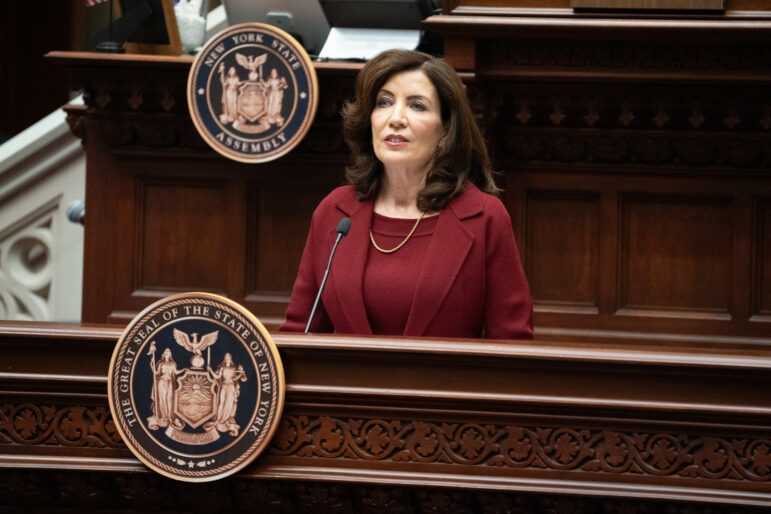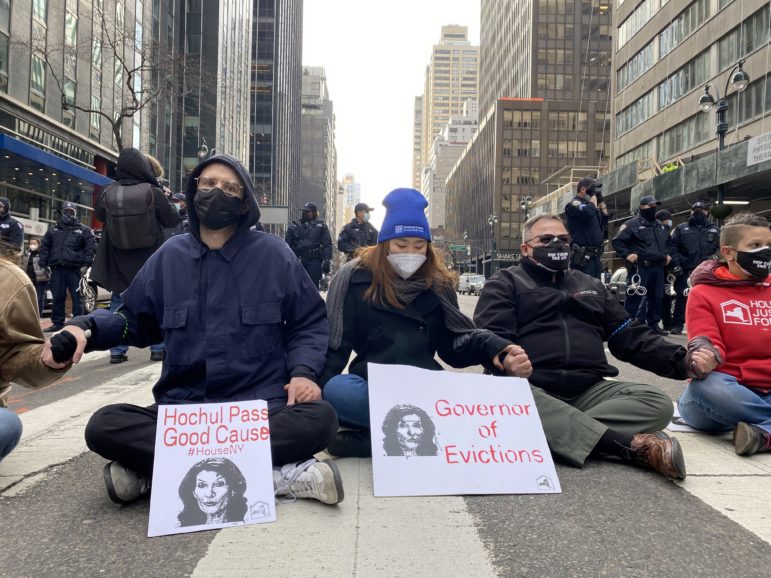After failing to pass her ambitious Housing Compact proposal last year, Gov. Kathy Hochul is using a lighter touch on housing—but state and city lawmakers have expressed hope for a potential compromise to both increase the development of affordable homes and protect tenants.

Mike Groll, Don Pollard, Susan Watts/Office of Governor Kathy Hochul
Gov. Kathy Hochul delivering her State of the State address in Albany on Jan. 9, 2024.Gov. Kathy Hochul delivered her State of the State address Tuesday afternoon in Albany outlining her legislative agenda for 2024, previewing new initiatives for public safety, healthcare and consumer protection.
Then, over 40 minutes in, she reminisced about her leading proposal from last year, which ultimately floundered—a broad plan to increase desperately needed housing development in the Empire State through production mandates.
“One year ago, I pushed what the New York Times described as the most ambitious housing plan since the Rockefeller administration in the 1960s. Unfortunately, many made it clear they would not support it. I knew we were unlikely to win this fight overnight or even in one year,” she said.
Given the governor’s recent remarks acknowledging the challenges of passing last year’s statewide housing plan and expressing reluctance to undergo a similar experience, the omission of something comparable in this year’s address may not come as a surprise to many observers.
“I’m not going to head down the same path we did last year with the exact same plan and in a year that is an election year for the members where they have [a] different focus and priorities,” the governor told reporters in November.
Instead, Hochul unveiled a suite of less divisive housing proposals Tuesday. Some, including basement apartment legalization, allowing for denser development in New York City and encouraging office-to-residential conversions, were proposed last year as well. She also called for expanded housing development on city-owned land, and to combat rental voucher discrimination.
As she did in 2022, the governor also called for a replacement to the state’s expired 421-a incentive, which offered tax breaks to developers in exchange for below-market rate apartments and wage standards for construction and service workers.
Popular in the real estate community, the abatement, which expired that year, has long faced criticism from progressive lawmakers and housing advocates who perceive it as a considerable concession for a limited number of affordable units.
RELATED READING: Gov. Hochul to Target Voucher Discrimination in Annual Address
But supporters say it’s needed to spur development and confront a dire shortage of affordable housing in New York, particularly for low income renters.
According to a National Low Income Housing Coalition analysis of American Community Survey (ACS) data, 73 percent of extremely low-income renters in the state are severely cost burdened, meaning more than half of their income goes toward rent.
A Citizens Budget Commission analysis of the 2022 ACS found that of 3.68 million housing units in New York City, only 2.5 percent were available for rent or sale, resulting in a historically low vacancy rate not seen in decades.
Meanwhile, despite Gov. Hochul’s reluctance to propose another ambitious housing development bill, both New York State Senate and Assembly leaders have openly alluded to a possible compromise deal, pairing policies to boost development with expanded tenant protections.*
“We must build more affordable housing across the state, but at the same time protect those in our existing housing stock. We can’t afford not to act,” said Assembly Speaker Carl Heastie during session-opening remarks to his colleagues last week.
Senate Majority Leader Andrea Stewart-Cousins made similar comments. “It’s time for us to develop a comprehensive plan that not only protects tenants, including the principles of good cause, but also paves the way for the construction of new, affordable housing,” she said.
First introduced in 2019, the good cause legislation as written is intended to help bring long term housing stability to renters outside of the state’s regulated housing market, which is currently concentrated in New York City and the near-city suburbs.
The bill would make it unlawful for most landlords to evict tenants or deny them lease renewals without establishing a cause, such as failure to pay rent or nuisance behavior. It would also allow tenants to challenge rent increases above a certain level—either 3 percent in a year, or 1.5 times the change in the consumer price index.

David Brand
Housing activists rallied for state lawmakers to pass good cause eviction legislation in January 2022.Hochul has not endorsed the proposal, and made no mention of it in her remarks Tuesday.
But in New York City, Mayor Eric Adams has said he’s open to something akin to good cause. In a conversation with Crain’s last month, Adams said he would consider endorsing good cause eviction protections in conjunction with a replacement for the 421-a tax break. “And they could call it whatever they want,” he told the outlet. “You could call it A-124, I could care less! The goal is to incentivize building.”
Adding some context to the mayor’s comment, a source familiar with City Hall’s thinking said that the mayor “really wants a new supply incentive, so that means he’s willing to talk about what’s necessary to get that done.”
Annemarie Gray, executive director of the pro-development group Open New York, said ahead of Hochul’s speech that she was feeling hopeful about advancing housing policy in 2024.
“The vast majority of New Yorkers want more and fairer housing opportunities,” she told City Limits. “Statewide efforts to solve the housing crisis through increasing supply and protecting tenants will benefit every community.”
“I hope to continue to see the governor do absolutely everything in her executive power unilaterally to solve the crisis,” she added. “But we all need to be very clear eyed, of the scale of reforms that are needed. We have to come together, both with the legislature and the governor.”
Assemblymember Linda Rosenthal, chair of her body’s housing committee, used the handshake emoji Tuesday to convey that housing supply and tenant protections go together.
I’ve said it before and I’ll say it again: housing supply 🤝 tenant protections.
— Linda B. Rosenthal “the #OriginalRosenthal” (@LindaBRosenthal) January 9, 2024
Looking forward to working with my colleagues + @GovKathyHochul to craft an holistic housing plan that addresses both the short-and-long term realities of NY’s housing shortage. #SOTS2024
But while talk swirls of compromises, some in the real estate industry are already expressing skepticism.
“I don’t know that that compromise is going to happen, and I don’t know that that’s even doable speaking from the perspective of the development side,” remarked James Power, a real estate development and land use advisor with Kramer Levin.
Homeowners for an Affordable New York, an industry group organized in opposition to good cause legislation, described other “practical and reasonable” tenant protection measures that it would be amenable to, like expanding funding for tenant lawyers and rental vouchers.
“Expanding the Right to Counsel statewide and funding the Housing Access Voucher Program are examples of tenant protections that would provide real, immediate relief to tens of thousands of New Yorkers,” a spokesperson for the organization said.
Tenant advocates, meanwhile, say they are unwilling to cede ground on their good cause eviction bill sponsored by Brooklyn Senator Julia Salazar and Assemblymember Pamela Hunter of Syracuse.
At the end of the 2023 legislative session, lobbyists and advocates tried to piece together the details of closed door negotiations toward a housing deal that never came to fruition.
Cea Weaver, campaign coordinator with Housing Justice for All, a statewide coalition of tenant groups, said some of the good cause modifications discussed at the time would be a non-starter for her group. These include allowing parts of the state to opt out of the law, and exemptions for more than the smallest, owner-occupied properties.
“The bill as it is is already the floor,” Weaver said.
In the meantime, Weaver and fellow organizers are excited about growing momentum for cities around the state to opt into rent stabilization. In 2019, changes to the state’s rent laws made it possible for any New York locality to adopt the regime, so long as they can demonstrate a prerequisite shortage of vacant affordable housing.
Rent stabilization places limits on annual rent adjustments and imposes a strict lease-renewal requirement.
The Hudson Valley cities of Kingston and Newburgh have opted in already, and preliminary vacancy studies have kicked off, or will soon launch, in Albany, Ithaca, Rochester and Poughkeepsie, according to Housing Justice for All. New Paltz conducted a vacancy survey, but has yet to take the next procedural step.
“That’s real estate’s biggest nightmare—more and more upstate cities opting into rent control,” said Mike McKee, treasurer of Tenants PAC. “That strengthens the tenant movement in immeasurable ways, and it’s something I’ve been dreaming of for 40 and 50 years, and it’s finally here.”
To reach the reporters behind this story, contact Chris@citylimits.org and Emma@citylimits.org.
*This story has been updated since original publication to clarify state legislative leadership’s position on a potential compromise, which called for policies to spur new housing but did explicitly mention a tax incentive.








